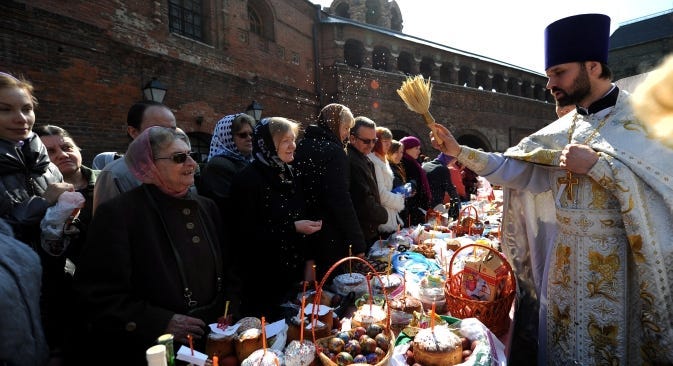Russia Reconfirms How Far Christianity Has Drifted From the Teachings of Christ
There is nothing today renewing or refreshing about Russia's 'way of life.'
Like so much in Russia, Easter, too, is a “Potemkin” affair. Shiny, polished, and colorful with over-the-top faux-religiosity, Russians bless breads, beat eggs together — this is what kids do instead of hunting for them — and otherwise regard the holiday as a day to offer up a few nods to the heavens just in case there is something beyond life on Earth.
In many ways, Russians treat Easter the same way Christians do all over the Earth; as our parish priest used to say, “If not for Christmas and Easter, I would never see half of you each year.” That was true for many, although my family went every Sunday when I was growing up. Having spent eight years in Catholic school, I believed in the idea of Christ and the resurrection. Today, I teach my son not so much about the gory details of the flogging, “crowning,” and public execution of Jesus but more about the concept of forgiveness and renewal.
This is the part that is missing in Russia. Most Russians know about the religious side. Most also don’t believe any of it, but since the fall of communism, they participate in a lot of the ritual of the day without putting an ounce of thought into what any of it means. There is no suggestion that the ethos of this day could renew them and reset the individual onto a better, more humane path. Instead, the few who do partake in the day’s traditions cloak themselves in the thoughtless side of the day: “Jesus has risen,” one person mindlessly says to another. “In truth, He has.”
And then, off they go about their lives regarding strangers with suspicion, gleefully supporting a war of genocide; making excuses for Russia’s theft of Ukrainian children who are then placed with families in Siberia and other far-off places. Whether you believe in the divinity of Jesus or not, there was a historical man whose teachings are beautiful. The power of His words motivates me in the same way that the practice of Zen Buddhism does. The wisdom and compassion gained from meditation for anyone being honest to both practices would prevent them from accepting Vladimir Putin — and Donald Trump (this article could just easily be about America’s right-wing Christians).
As you may know, I lived in Russia for 30 years before the start of the war. I watched Russia evolve from an awkward and scared country that had seen its governing system collapse, labeled “bad,” to be replaced by a Frankenstein system that became more corrupt and accommodating to a dictator like Putin. As each year passed and Russians struggled through this era of change, religion rose to become “popular” and a way for many people to hide from the viciousness of their daily lives. The seething dislike Russians feel for each other that lies just beneath the surface was concealed behind the faux religiosity.
Having outlawed religion for 70 years and destroyed tens of thousands of churches around the country, in the mid-90s, Russians suddenly declared themselves the “holiest people” in Europe. Like everything else in Russia, the loud, obnoxious, and overconfident proclamation of their superior religiosity was just a cover, a psychological Potemkin Village, for their flawed, misdeveloped sense of self. It masked the weakness of what it means to be Russian.
Easter in Russia is not until May 5th. There is a lot of time between now and then for Russians to go through their over-the-top suffering of Lent — it’s called “Post” in Russian. Between today, our day of renewal for non-orthodox Christians, Russians will go through the motions like their version of Christianity is the best thing since sliced bread. They make the sign of the cross three times with broad, sweeping motions and then bow so blind people can even see them — “Look at me, look at me, I am religious, so that means I am better than you!” It’s all so sadly insincere.
On May 5th, I will participate in the orthodox Easter traditions because my wife is Russian. She believes in no God, like most Russians, but goes through the motions because it is a “Russian thing.” I respect that part of the day. It is a “Russian thing,” and I have always supported that aspect of it in Russia. In the ‘90s’, I felt bad for Russians because, in the blink of an eye, everything they knew was declared bad, all of the traditions were deemed wrong, and they were set adrift. I used to tell my friends that the country needed to find “Russian things” to grow out of the Soviet side.
Russia instead reattached itself to the same emptiness of the Soviet Union. It chose insincerity, hostility, and misguided opposition to everyone on the Earth as the “way to go.” Russia instead grasped onto all of the sickness and vapidness that killed the Soviet Union. Most Russians wanted to move on past that “Soviet way,” but Putin, who is a small, cowardly man who regarded the sickness of the Soviet system as his “glory days,” pulled them back and told them, “All is okay as it is. Why do we need to change? They need to change. We are good.”
Russia isn’t good, and sadly, most Russians today who choose Putin as their “holy leader” are also not good — and then they make the sign of the cross three times, bow, and regard themselves as a “chosen people.”
Soon, it will be Easter in Russia, and the village’s paintwill be refreshed, but nothing in Potemkinville ever really changes.



